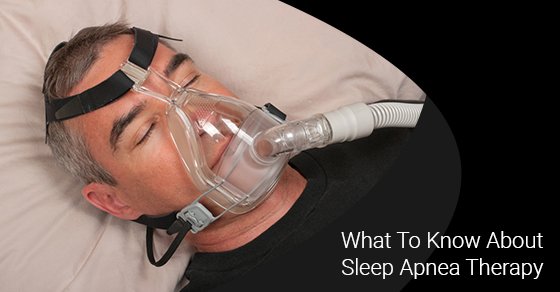Sleep apnea is a disorder that consists of interrupted breathing while sleeping. Symptoms include shallow breathing and brief pauses that can last up to several minutes. Interruptions to your breathing can occur at various times during sleep and are often associated with snoring, snorting, or choking symptoms.

Over time, this affects the quality and quantity of a person’s sleep, which leads to long-term fatigue and other health problems. Sleep apnea has also be linked to hyperactivity and performance issues at school for students.
The following are four things to keep in mind before undergoing sleep apnea therapy.
- Signs of Sleep Apnea in addition to those characteristics already mentioned, sleep apnea can be linked to headaches, an inability to concentrate, and a frequent need to wake up to go to the bathroom at night. Also note that certain sleep aids may worsen the condition—here’s whether sleep medications can aggravate sleep apnea. Individuals with sleep apnea often wake up experiencing shortness in their breathing as well as a sore throat or dry mouth. Gasping and choking symptoms are also common in some cases and are an indication that a person needs to seek treatment. When you’re ready to explore options, here are four ways your dentist can help relieve sleep apnea.
- The 2 Types of Sleep ApneaObstructive sleep apnea is characterized by the full or partial blockage of the airways. There are many factors that contribute to these actions including the excessive relaxation of the throat muscles.Weight gain can cause the trachea to become narrow, and large tonsils can obstruct the trachea and restrict a person’s ability to breath.Central sleep apnea occurs less frequently and is related to the signaling of the brain that controls the breathing muscles. When these signals stop, breathing is interrupted. Central sleep apnea is often linked to neurological issues, such as Parkinson’s disease and problems related to the brain stem. Mixed sleep apnea, a combination of the two types can also occur in some patients.
- Sleep Apnea Has Been Linked to Obesity Obesity is a risk factor for developing sleep apnea. Men who are overweight or obese and older than 60 have a greater chance of developing sleep apnea than women do.Sleep apnea therapy can be beneficial, but it’s important to consider factors like obesity so that you can implement the right strategies to provide better results to your overall treatment program. For additional motivation, explore the five benefits of sleep apnea treatment.
- Sleep Apnea TestingYour doctor can review your health history and perform a physical evaluation to determine if you’re suffering from sleep apnea.Sleep tests are also used in the testing and diagnosis process. They measure eye movements, blood pressure, and brain activity, among other factors, to determine the presence of sleep apnea.
These are four things to keep in mind before undergoing sleep apnea therapy. Understanding the different types of sleep apnea, the risk factors, and treatment methods gives you the resources you need to find relief and improve your quality of life.